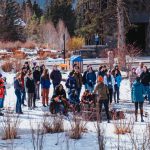World Water Day: Accelerating change
Read the web version here.
Today is World Water Day and the opening day of the 2023 United Nations Water Conference at UN Headquarters in New York. As the first gathering of its kind since 1977, this conference aims to make long-needed progress towards water-related goals and targets, both locally and globally. To mark this significant day, we’re sharing our latest freshwater stories and announcements.

Piloting new technology through an Indigenous lens
With a scoop of water, a new technology called iTrackDNA can potentially track biodiversity information with more accuracy and less disturbance to the species being studied. Co-led and developed by the University of Victoria and INRS (Institut National de la Recherche Scientifique), this project involves 52 partners and First Nations communities across Canada. Living Lakes Canada, in partnership with two First Nations communities, is helping to co-develop the field training and study design.


Evolving our understanding of ancient groundwater
March 20 – 24 is Canadian Ground Water Week and raises the importance and the need to protect groundwater. New research from the University of Saskatchewan challenges us to reconsider our understanding of groundwater. The findings show that groundwater deeper than 500m is essentially independent from the surface water that we see in lakes, rivers, and wetlands. It’s estimated that two-thirds of the Earth’s groundwater is ancient and more than 12,000 years old, meaning that these aquifers are extremely vulnerable to unsustainable extraction and persistent contamination if they become polluted.
As part of the 2023 British Columbia Ground Water Association Convention taking place April 13-15, Carol Luttmer, Data and Field Manager for Living Lakes Canada’s Columbia Basin Groundwater Monitoring Program will present our community-based approach to groundwater monitoring to help fill data gaps for Basin communities.


Bringing Canadian water priorities to the UN Water Conference
While the water crisis is a global issue, water problems are solved locally. It’s with this lens that Living Lakes Canada will be attending the UN 2023 Water Conference, to learn from the international community, share knowledge and encourage water-related actions through solidarity. From March 22 – 24, Living Lakes Canada’s Nicole Trigg and Georgia Peck will attend various plenary sessions, side events and interactive dialogues.
On the final day of the conference, Living Lakes Canada will host a UN Virtual Side Event with several of our Living Lakes International partners. This 75-minute joint panel presentation will focus on the importance of international water stewardship and sharing on-the-ground community-based best practices.


Still time to sign up and become a citizen scientist this summer
Do you love your local lakes and want to help protect them for future generations? Join the Living Lakes Canada network of volunteer lake monitors in getting outside this summer to help protect lakes across Canada. When you register for the 2023 National Lake Blitz, you’ll receive a free Lake Blitz Standard Kit to monitor a lake of your choice from May to September. Registration closes on April 30.


Gathering community concerns around water
The Columbia Basin Water Monitoring Framework is expanding into two new hydrologic regions in 2023 after a successful pilot year in 2022. Since the beginning of February, 125 people participated in six in-person community meetings and one virtual session and expressed eagerness to be involved in decision making around water monitoring. This community engagement aims to capture freshwater concerns and priorities while raising awareness of climate change impacts on watersheds. Feedback received by communities will help inform the selection of new monitoring sites. If you live in the Lower Columbia Kootenay region, there is one final online community meeting on April 4th from 2-3:30 pm PT.


The story of Bjerkness Creek
Every creek has a story to tell. Water monitoring data helps tell that story. For almost a decade, the Kootenay Watershed Science program has monitored Bjerkness Creek near Kaslo, B.C. This dataset, with over 215,000 records, tells the story of Bjerkness Creek and can help us predict how climate change will continue to impact this watershed.


Join the Living Lakes Canada team
Are you passionate about all things water? We’re growing our team of incredibly dedicated people to help expand our water monitoring efforts across Canada. Here are our current job opportunities:
Coordinator, Water Monitoring Programs

Upcoming Events
Friday, March 24, 2023 at 8:00 am ET – International Opportunities and Benefits of Sharing Best NGO Practices in Community-Based Water Stewardship. This UN Water Conference Side Event will feature water stewardship efforts in the Canada-U.S. transboundary Columbia River Basin, the volcanic chain of Guatemala, the African Great Lake known as Lake Malawi and lakes of the Columbian Andes. Hosted by Living Lakes Canada (Canada), Asociacion Vivamos Mejor (Guatemala), Global Nature Fund (Germany), Action for Environmental Sustainability-Malawi (Malawi) and Fundación Humedales (Colombia). Register here.
Monday, April 10, 2023 at 1 pm ET / 10 am PT – Biomonitoring is for everyone: How project STREAM combines citizen science with DNA technology. This free webinar will discuss how small bugs called benthic macroinvertebrates give us a window into the status of freshwater health. You’ll also learn how you can monitor your local rivers. Hosted by Project STREAM, alongside project partner, Living Lakes Canada, and Watersheds Canada. Register here.

Enjoy reading our newsletter? Share it with a friend!





